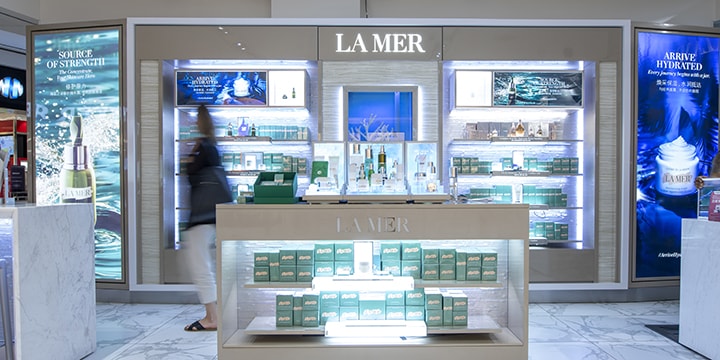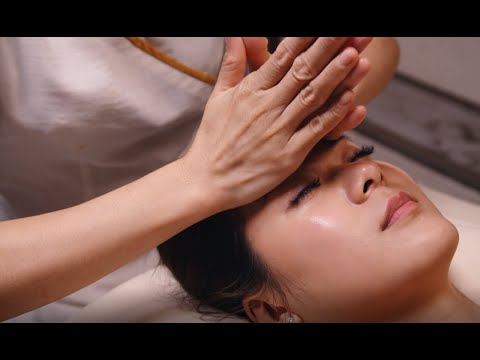La Mer stands as an iconic brand in the world of luxury skincare, renowned for its transformative formulations and commitment to blending scientific innovation with natural ingredients. Founded by aerospace physicist Dr. Max Huber, La Mer’s origins trace back to Huber’s personal quest to heal severe burns he sustained in a laboratory accident. His journey led to the development of the legendary “Miracle Broth,” a highly potent elixir crafted from nutrient-rich sea kelp and other marine extracts. This breakthrough became the cornerstone of La Mer’s skincare philosophy, celebrated for its remarkable healing and anti-aging properties.

La Mer’s flagship product, Crème de la Mer, debuted in 1965 and quickly garnered a cult following due to its unique formulation and claims of visible skin rejuvenation. The cream’s luxurious texture and transformative benefits propelled it to iconic status in the beauty industry, making it a coveted item among celebrities, skincare enthusiasts, and beauty editors worldwide. Today, La Mer operates under the umbrella of Estée Lauder Companies, which acquired the brand in 1995, ensuring its continued expansion and global influence in the luxury skincare market.
Central to La Mer’s brand identity is its unwavering commitment to quality and craftsmanship. Each La Mer product undergoes meticulous formulation and testing to uphold the brand’s exacting standards of excellence. The brand emphasizes the use of sustainable and responsibly sourced ingredients, particularly marine botanicals harvested using eco-friendly practices to minimize environmental impact. This commitment to sustainability underscores La Mer’s dedication not only to luxury but also to environmental stewardship and ethical sourcing practices.
Beyond its iconic Crème de la Mer, La Mer offers a comprehensive range of skincare products tailored to address various skin concerns. These include serums, moisturizers, cleansers, masks, and targeted treatments, all infused with the Miracle Broth or other proprietary complexes designed to deliver visible results and promote overall skin health. La Mer’s product offerings cater to a discerning clientele seeking premium skincare solutions backed by decades of scientific research and a luxurious skincare experience.
In terms of marketing, La Mer strategically positions itself as a symbol of luxury, efficacy, and timeless beauty. The brand leverages its rich heritage and the exclusive allure of its products to maintain its prestige in the beauty industry. Celebrity endorsements and high-profile partnerships with renowned makeup artists, skincare experts, and luxury retailers further reinforce La Mer’s luxury status. The brand’s marketing campaigns often highlight its scientific approach and the transformative effects of its products, appealing to consumers who prioritize visible results and indulgent skincare rituals.
In recent years, La Mer has expanded its global footprint, establishing flagship stores in major cities around the world and securing a prominent presence in top-tier department stores and luxury retailers. Digital marketing plays an increasingly crucial role in La Mer’s strategy, with the brand leveraging interactive online experiences, targeted social media campaigns, and strategic influencer collaborations to reach a broader audience and amplify brand visibility.
In conclusion, La Mer continues to epitomize luxury, innovation, and skincare expertise. With a legacy rooted in scientific discovery and natural healing, La Mer remains at the forefront of transformative skincare, setting benchmarks in the beauty industry. Coveted for its efficacy and indulgent formulations, La Mer appeals to those who seek the ultimate in beauty rituals and visible skin rejuvenation, solidifying its position as a global leader in luxury skincare.
Marketing Strategies of La Mer
La Mer utilizes a range of sophisticated marketing strategies to maintain its esteemed position. These strategies encompass leveraging its rich heritage, emphasizing innovative product design, implementing a strategic pricing model, fostering strategic partnerships, enhancing digital and social media presence, executing innovative marketing campaigns, and expanding its global reach while localizing efforts. Here’s an in-depth exploration of these marketing strategies:
1. Luxury Positioning and Brand Storytelling
La Mer’s origin story is a key part of its luxury positioning and brand storytelling. The brand was founded by Dr. Max Huber, an aerospace physicist who suffered severe burns in a lab accident and spent 12 years and 6,000 experiments searching for a solution to heal his skin. Huber’s breakthrough came when he discovered the healing powers of sea kelp and developed a proprietary fermentation process to create the brand’s hero ingredient, Miracle Broth™. This cell-renewing elixir is at the heart of Crème de la Mer and all La Mer products. The brand’s name, “Crème de la Mer” or “Cream of the Sea”, pays homage to Huber’s muse – the sea. This rich origin story and the brand’s connection to the restorative powers of the ocean are central to La Mer’s luxury positioning. Since being acquired by Estée Lauder in 1995, La Mer has expanded its reach and adapted its marketing strategy to appeal to younger consumers, embracing e-commerce and launching a flagship store on Tmall in China, where it has seen strong sales from younger, digitally-savvy consumers.
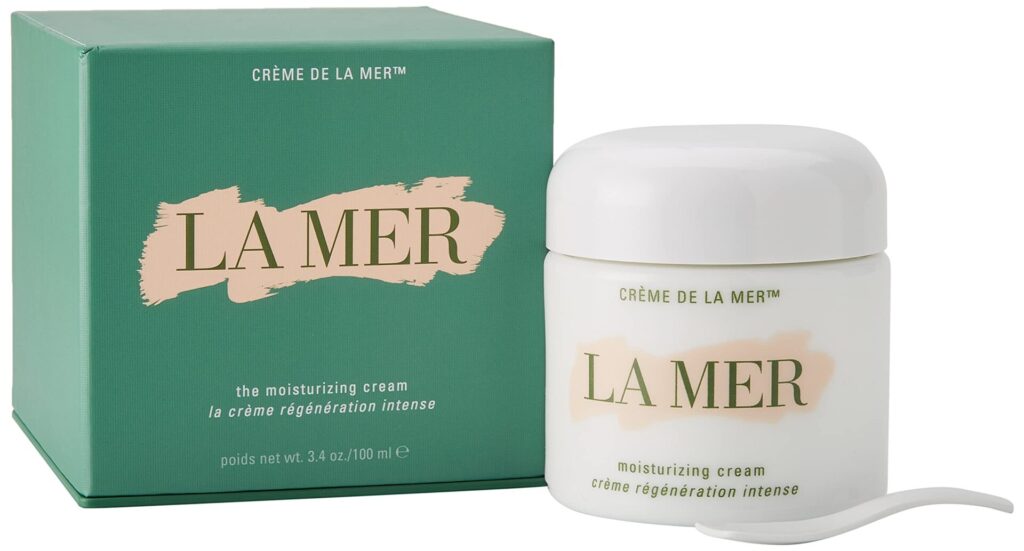
Additionally, La Mer products are priced at a significant premium, with the iconic Crème de la Mer moisturizer retailing for over $100 for a small jar. This premium pricing strategy is supported by the brand’s exclusivity and limited-edition offerings. La Mer carefully controls distribution, only selling through select luxury retailers and its own channels. The brand also frequently releases limited-edition products and packaging, further driving the perception of exclusivity and scarcity. Additionally, the lengthy 3-4 month fermentation process required to create the Miracle Broth™ contributes to the high cost and limited supply of La Mer products. This premium pricing, exclusivity, and limited availability are all key elements of La Mer’s luxury brand positioning. However, the brand has faced some scrutiny in China over allegations of false advertising related to the claims about the Miracle Broth™.
2. Targeted Marketing and Consumer Engagement
La Mer’s targeted marketing strategy is meticulously designed to engage a discerning audience, focusing on affluent consumers and beauty enthusiasts. The brand targets high-net-worth individuals who value premium quality and are willing to invest in luxury skincare. These consumers seek products that offer exceptional benefits and an exclusive experience. Additionally, La Mer appeals to beauty enthusiasts and influencers who are influential within the skincare community. For instance, La Mer collaborated with high-profile beauty influencers and dermatologists to create authentic content that showcases the brand’s efficacy and luxurious appeal. These partnerships help amplify La Mer’s reach and credibility, positioning it as a must-have brand in the luxury skincare market.
Personalized customer experiences are a cornerstone of La Mer’s engagement strategy, offering high-touch services that foster loyalty and enhance brand perception. La Mer provides bespoke skincare consultations both in-store and online, ensuring that each customer receives tailored advice and product recommendations. This personalized approach not only enhances the customer’s experience but also builds a deeper connection with the brand. High-touch services such as facial treatments at luxury retail locations, like the La Mer spa at the Ritz-Carlton in Singapore, exemplify La Mer’s commitment to providing exceptional care. Additionally, La Mer’s loyalty programs, such as the “Blue Heart Oceans Fund” initiative, offer exclusive benefits like early access to new products, special gifts, and invitations to private events, rewarding loyal customers and encouraging repeat purchases.
La Mer’s consumer engagement extends beyond traditional marketing to include innovative digital strategies and community building. The brand maintains a strong online presence through its sophisticated website and active social media channels, where it shares engaging content, tutorials, and customer testimonials. These platforms also serve as a venue for direct interaction with consumers, allowing La Mer to respond to inquiries and feedback promptly. For instance, La Mer enhanced its digital engagement by incorporating virtual consultations and live streaming events. For example, during the COVID-19 pandemic, La Mer introduced virtual skincare consultations to help consumers maintain their skincare routines from home. Additionally, live streaming events featuring skincare experts and brand ambassadors have provided real-time product demonstrations and Q&A sessions. By combining personalized experiences with digital innovation, La Mer effectively engages its target audience, fostering loyalty and sustaining its luxury brand image.
3. Innovative Product Launches and Collaborations
La Mer’s innovative product launches are a testament to its commitment to excellence and continuous improvement in skincare. The brand invests heavily in research and development to create advanced formulations that address a variety of skin concerns. A prime example of this is the recent launch of the “Genaissance de La Mer” line, which features products infused with the potent Crystal Miracle Broth™, a refined version of their signature Miracle Broth™. This line showcases La Mer’s dedication to pushing the boundaries of skincare science to deliver unparalleled results. By consistently introducing new and improved products, La Mer reinforces its position as a leader in luxury skincare.
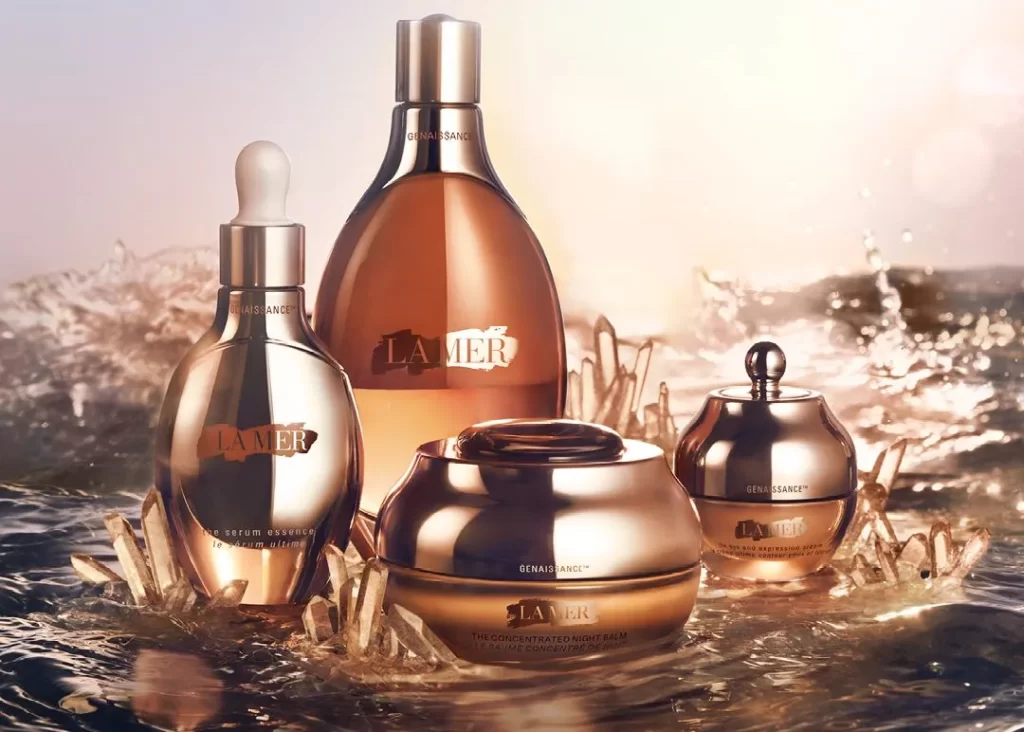
Sustainability is another crucial aspect of La Mer’s product innovation. The brand is committed to incorporating sustainable practices throughout its product development process. For instance, La Mer sources its key ingredient, sea kelp, sustainably and uses eco-friendly packaging materials. In 2023, La Mer introduced the “Blue Heart Crème de la Mer” in limited edition packaging to raise awareness for ocean conservation efforts. This product not only underscores La Mer’s dedication to environmental sustainability but also engages consumers who are increasingly mindful of the environmental impact of their purchases.
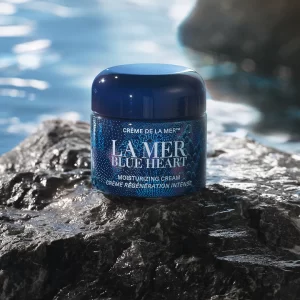
Collaborations play a significant role in La Mer’s marketing strategy, enhancing brand visibility and appeal through strategic partnerships. Designer collaborations, such as the partnership with renowned fashion house Bottega Veneta, have resulted in limited edition products with exclusive packaging that combine luxury skincare with high fashion. These collaborations create a buzz in the market and attract attention from both skincare enthusiasts and fashion aficionados. Additionally, La Mer’s charitable collaborations further elevate its brand image. Through initiatives like the “La Mer Blue Heart Oceans Fund,” the brand supports marine conservation projects globally. In 2022, La Mer partnered with National Geographic to fund research and conservation efforts aimed at protecting marine environments. These collaborations not only highlight La Mer’s commitment to social responsibility but also resonate with consumers who value brands with a strong ethical stance.
https://www.youtube.com/watch?app=desktop&v=Th3vo1-pghs
4. Experiential Marketing
La Mer’s experiential marketing strategy is a key component in creating immersive and memorable experiences for its customers, reinforcing its luxury brand image. In-store experiences play a pivotal role, with La Mer offering personalized skincare consultations and treatments at high-end retail locations. These bespoke services allow customers to experience the brand’s products firsthand, guided by expert skincare advisors. A notable example is the La Mer spa at the Baccarat Hotel New York, where customers can indulge in exclusive facial treatments that showcase the efficacy of La Mer’s products. These high-touch services not only elevate the brand’s prestige but also foster deep, personal connections with customers.
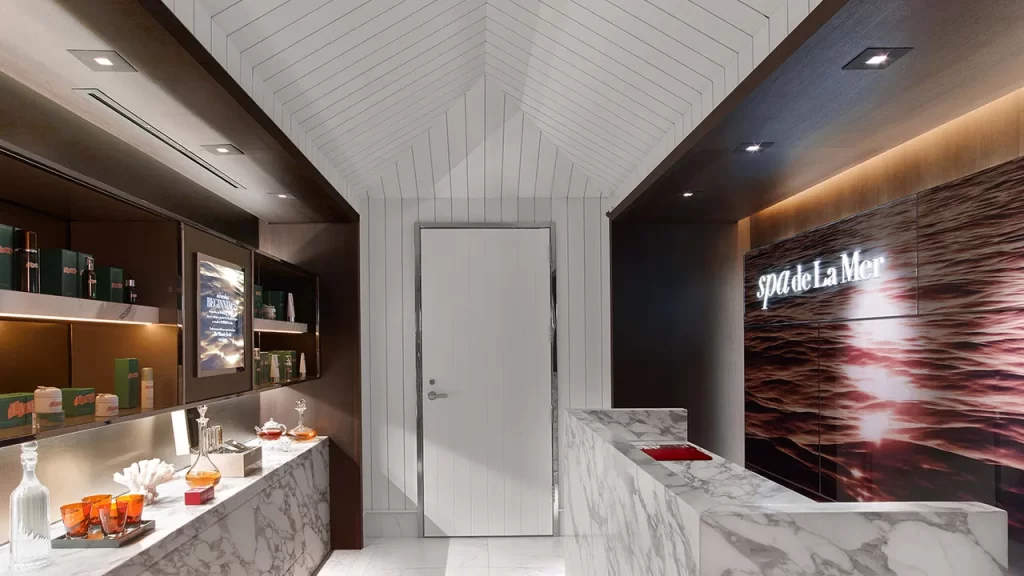
Pop-up stores and in-store events are another vital aspect of La Mer’s experiential marketing. These temporary, immersive retail spaces are designed to create a buzz and attract new customers. For instance, in 2023, La Mer launched a series of pop-up stores in major cities like Paris, Tokyo, and Los Angeles. These pop-ups featured interactive elements such as skin analysis stations, product sampling, and educational workshops led by skincare experts. In-store events, such as exclusive product launch parties and masterclasses, offer customers unique opportunities to engage with the brand in a luxurious setting. By creating these memorable experiences, La Mer not only boosts brand awareness but also drives customer loyalty and word-of-mouth referrals.
Sampling programs are an integral part of La Mer’s strategy to introduce potential customers to its premium products. The brand frequently offers product samples through various channels, including in-store, online orders, and special promotional events. For example, during the holiday season, La Mer often includes deluxe samples of its best-selling products in gift sets or as complimentary additions to purchases. Additionally, La Mer collaborates with luxury subscription boxes like Birchbox to distribute samples to a targeted audience of beauty enthusiasts. These sampling initiatives allow consumers to experience the transformative effects of La Mer’s products firsthand, increasing the likelihood of future purchases. By leveraging experiential marketing, La Mer effectively showcases its products’ quality and luxury, strengthening its market position and deepening customer engagement.
5. Digital and Social Media Marketing
La Mer’s digital and social media marketing strategy is pivotal in maintaining its luxury brand image and engaging with a global audience. A robust online presence is foundational to this strategy, with a sophisticated website and e-commerce platform that offers an immersive brand experience. The La Mer website is meticulously designed, providing detailed product information, high-quality visuals, and customer reviews. The e-commerce platform is seamlessly integrated, allowing for easy navigation and a premium shopping experience. To drive traffic to its site, La Mer invests in SEO (Search Engine Optimization) and SEM (Search Engine Marketing), ensuring that the brand appears prominently in search results for luxury skincare. This digital strategy not only enhances visibility but also captures potential customers actively searching for premium skincare solutions.
Social media engagement is another critical component of La Mer’s digital marketing strategy, with a significant presence on platforms like Instagram and Facebook. La Mer’s Instagram account, with 1.1 millions followers, showcases stunning visuals of products, behind-the-scenes content, and user-generated posts from customers and influencers. This platform is used to highlight the brand’s luxurious lifestyle and connect with beauty enthusiasts. On Facebook, La Mer shares product launches, skincare tips, and engages with its community through comments and messages.
Influencer partnerships play a strategic role in La Mer’s social media marketing, leveraging the influence of beauty gurus and celebrities to amplify the brand’s message. Collaborations with high-profile influencers like Olivia Palermo have resulted in highly engaging content that resonates with their massive followings. These influencers often share their skincare routines featuring La Mer products, providing authentic endorsements that drive consumer trust and interest. Additionally, La Mer partners with skincare experts and dermatologists to create educational content that underscores the science and efficacy behind its products.
https://www.youtube.com/watch?v=xxa09_FRfes
By integrating influencer partnerships with a strong social media presence and effective digital marketing tactics, La Mer not only enhances brand awareness but also cultivates a loyal and engaged customer base.
6. Strategic Distribution Channels
La Mer’s strategic distribution channels are integral to maintaining its luxury brand image and ensuring product accessibility to its discerning clientele. The brand employs a selective distribution strategy, choosing to partner with high-end retailers that align with its premium positioning. La Mer products are available in luxury department stores such as Neiman Marcus, Saks Fifth Avenue, and Harrods, where the brand benefits from the exclusive ambiance and high-quality service these retailers provide. This selective approach not only enhances the brand’s prestige but also ensures that the shopping experience matches La Mer’s luxurious ethos.
E-commerce platforms are another critical aspect of La Mer’s distribution strategy, providing a seamless and premium online shopping experience. The brand’s own website is a central hub for its e-commerce operations, offering detailed product descriptions, usage guides, and customer reviews. La Mer also collaborates with high-end online retailers like Sephora, Net-a-Porter, and Nordstrom, ensuring that its products are accessible to a global audience. These platforms offer a convenient shopping experience while maintaining the brand’s exclusive feel through curated content and personalized recommendations. By leveraging both its own e-commerce site and partnering with luxury online retailers, La Mer ensures it meets the demands of its tech-savvy, affluent customers.
Global reach is a cornerstone of La Mer’s distribution strategy, with a focus on international expansion to capture new markets and enhance brand visibility. The brand has established a strong presence in key markets across North America, Europe, and Asia, recognizing the growing demand for luxury skincare products worldwide. For example, La Mer has expanded its footprint in China, where it opened flagship stores in major cities like Shanghai and Beijing, and launched localized e-commerce platforms to cater to Chinese consumers. Additionally, La Mer’s products are available on global online marketplaces such as Tmall and JD.com, which are popular among international shoppers. This strategic international expansion ensures that La Mer’s products are accessible to a wider audience, driving global growth and reinforcing its position as a leading luxury skincare brand.
La Mer’s marketing strategy is a comprehensive blend of luxury branding, personalized customer engagement, innovative product development, strategic digital presence, and experiential marketing. By maintaining its premium positioning and continually engaging with its target audience, La Mer sustains its reputation as a leading luxury skincare brand.
Marketing Mix of La Mer
La Mer strategically crafts its Marketing Mix to epitomize exclusivity, efficacy, and prestige in the beauty industry. This iconic brand excels in each element of the Marketing Mix—Product, Price, Place, and Promotion—to cater to discerning consumers who value quality, innovation, and a transformative skincare experience. From its pioneering Crème de la Mer enriched with the Miracle Broth™ to its strategic distribution in upscale retail environments and digital engagement strategies, La Mer exemplifies excellence across every facet of its marketing strategy.
1. Product
Product Range and Innovation: La Mer’s product portfolio includes a range of skincare solutions tailored to address various skin concerns such as hydration, anti-aging, and brightening. Key products include:
- Crème de la Mer: The flagship product known for its rich texture and rejuvenating properties, formulated with the Miracle Broth™.
- Serums and Treatments: Advanced serums like “The Revitalizing Hydrating Serum” and specialized treatments such as “The Eye Concentrate” cater to specific skincare needs.
- Cleansers and Masks: Gentle cleansers and nutrient-rich masks like “The Cleansing Foam” and “The Intensive Revitalizing Mask” complete the skincare regimen.
Innovation and Sustainability: La Mer continually invests in research and development to innovate its product formulations. Recent innovations include the incorporation of advanced technologies like Crystal Miracle Broth™ in the “Genaissance de La Mer” collection, targeting deep rejuvenation and skin renewal. Sustainability is also a focus, with efforts to responsibly source sea kelp and other natural ingredients, as well as using recyclable packaging materials where possible.
2. Price
Premium Pricing Strategy: La Mer’s pricing strategy reflects its luxury positioning, with products priced significantly higher than mainstream skincare brands. For example, the iconic Crème de la Mer can range from $180 to over $2,000 for limited edition versions. The premium pricing strategy is justified by the brand’s commitment to quality ingredients, scientific innovation, and the luxurious experience associated with using La Mer products.
Limited Editions and Special Collections: To further enhance its pricing strategy, La Mer releases limited edition products and special collections. These include exclusive formulations or packaging collaborations with renowned designers like Marc Chagall or special themed collections tied to charitable causes. Limited editions create scarcity and exclusivity, appealing to collectors and luxury consumers who seek unique, high-value skincare items.
3. Place
Selective Distribution Channels: La Mer strategically places its products in upscale retail environments that align with its luxury brand image. This includes department stores like Harrods in London, Saks Fifth Avenue in New York, and Galeries Lafayette in Paris. These locations not only provide high visibility but also offer a premium shopping experience that complements the brand’s positioning.
E-commerce Presence: La Mer’s e-commerce strategy focuses on its official website and partnerships with luxury online retailers. The brand’s website serves as a flagship platform for direct-to-consumer sales, providing a seamless shopping experience with detailed product information and skincare advice. Additionally, La Mer partners with prestigious e-commerce platforms like Net-a-Porter and Sephora’s online store, expanding its global reach and catering to digitally savvy consumers who prefer online shopping.
4. Promotion
Brand Storytelling and Heritage: La Mer’s promotional strategy emphasizes storytelling to evoke emotions and connect with consumers on a deeper level. The brand leverages its origin story of Dr. Max Huber’s journey to create Crème de la Mer, highlighting the transformative power of its products. This narrative is woven into advertising campaigns, social media content, and in-store experiences, reinforcing La Mer’s heritage as a pioneering luxury skincare brand.
Social Media Engagement: La Mer maintains an active presence on social media platforms such as Instagram, Facebook, and YouTube. These channels are used to share visually captivating content, skincare tips, and user-generated testimonials that engage followers and foster a community of loyal customers. Influencer partnerships with beauty influencers and celebrities further amplify La Mer’s message, showcasing product endorsements and tutorials that resonate with their extensive audiences.
Experiential Marketing Initiatives: To enhance consumer engagement, La Mer employs experiential marketing tactics such as in-store events, pop-up stores, and sampling programs. In-store events include product launch parties, skincare consultations, and masterclasses led by experts. Pop-up stores in major cities offer immersive brand experiences with interactive elements like skin analysis stations and exclusive product demonstrations. Sampling programs provide consumers with opportunities to try La Mer products firsthand, encouraging trial and subsequent purchase.
By meticulously managing each element of its Marketing Mix, La Mer effectively positions itself as a leader in the luxury skincare market, appealing to affluent consumers who seek premium quality, innovation, and a luxurious brand experience.
Also Read: Estée Lauder : Exploring the Marketing Strategies of Beauty Empire
To read more content like this, subscribe to our newsletter

